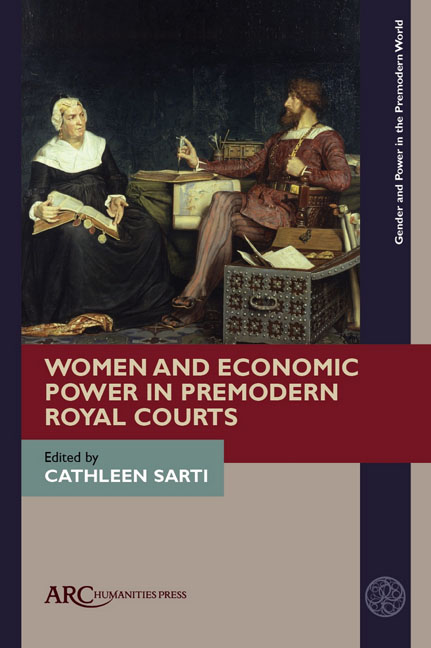Book contents
- Frontmatter
- Contents
- Acknowledgements
- Introduction: Women and Economic Power in Premodern Royal Courts
- 1 The Medieval English Queen as Landholder: Some Reflections on Sources and Methodology
- 2 Financial Power of Empresses and Princess Consorts of the Holy Roman Empire
- 3 “Edward III’s Gold-Digging Mistress”: Alice Perrers, Gender, and Financial Power at the English Royal Court, 1360– 1377
- 4 Counselling the Danish King: Sigbrit Villoms as Financial Mastermind for Christian II, 1513– 1523
- Afterword: “Power Is Money”? Reflections on Money, Power, Sex, and Gender in Premodern Royal Courts
- Bibliography
- Index of Persons and Topics
1 - The Medieval English Queen as Landholder: Some Reflections on Sources and Methodology
Published online by Cambridge University Press: 20 November 2020
- Frontmatter
- Contents
- Acknowledgements
- Introduction: Women and Economic Power in Premodern Royal Courts
- 1 The Medieval English Queen as Landholder: Some Reflections on Sources and Methodology
- 2 Financial Power of Empresses and Princess Consorts of the Holy Roman Empire
- 3 “Edward III’s Gold-Digging Mistress”: Alice Perrers, Gender, and Financial Power at the English Royal Court, 1360– 1377
- 4 Counselling the Danish King: Sigbrit Villoms as Financial Mastermind for Christian II, 1513– 1523
- Afterword: “Power Is Money”? Reflections on Money, Power, Sex, and Gender in Premodern Royal Courts
- Bibliography
- Index of Persons and Topics
Summary
THE HISTORICAL STUDY of queenship developed from feminist scholars’ interest in women of power and a growing movement of political history discussing the expansion of power to specific elite groups. Queenship research changed both subject and theoretical frameworks by describing “practices of queenship in Western Europe […] in terms of marriage, motherhood, court ceremonial, sexuality, religion, literature, art history, and […] political authority.”
Key works in the scholarship of royal women note that although a queen's power originated from the king, a queen still represented and exercised her own authority.These studies have observed that a queen's power came not only from her role as mediator and influencer but also from familial connections, the education or guardianship of children, and the control of money. What is clear is that this agency was dependent, in some way, on the king or the institution of the crown.
A fundamental element of a queen's power came in the form of her economic revenue. As with any great magnate or king, a medieval queen's income was important to supporting her political power. However, this aspect of a queen's agency has remained understudied, with John Carmi Parsons noting that a dislike for administrative and institutional history has impeded deeper investigation of the resources of queenship. In recent years, many more works have analyzed different elements of a queen's income, including her holdings, her queens’ gold, and her household and exchequer. The work of Hilda Johnstone was some of the earliest to consider the importance of a queen's income and administration, analyzing the connections between a king and a queen's administrative offices and power. Amalie Fößel's work on a queen's wealth in the Middle Ages seconds this, and questions whether a queen's vast income indicated her position as an “officeholder,” and whether there was a direct link between a queen's finances and her authority. This is continued in the work of Attila Bárány, who states that “income is clearly linked to power” and observes that many questions regarding the income of royal women, and indeed queens, have yet to be analyzed and answered.
- Type
- Chapter
- Information
- Women and Economic Power in Premodern Royal Courts , pp. 9 - 34Publisher: Amsterdam University PressPrint publication year: 2020



